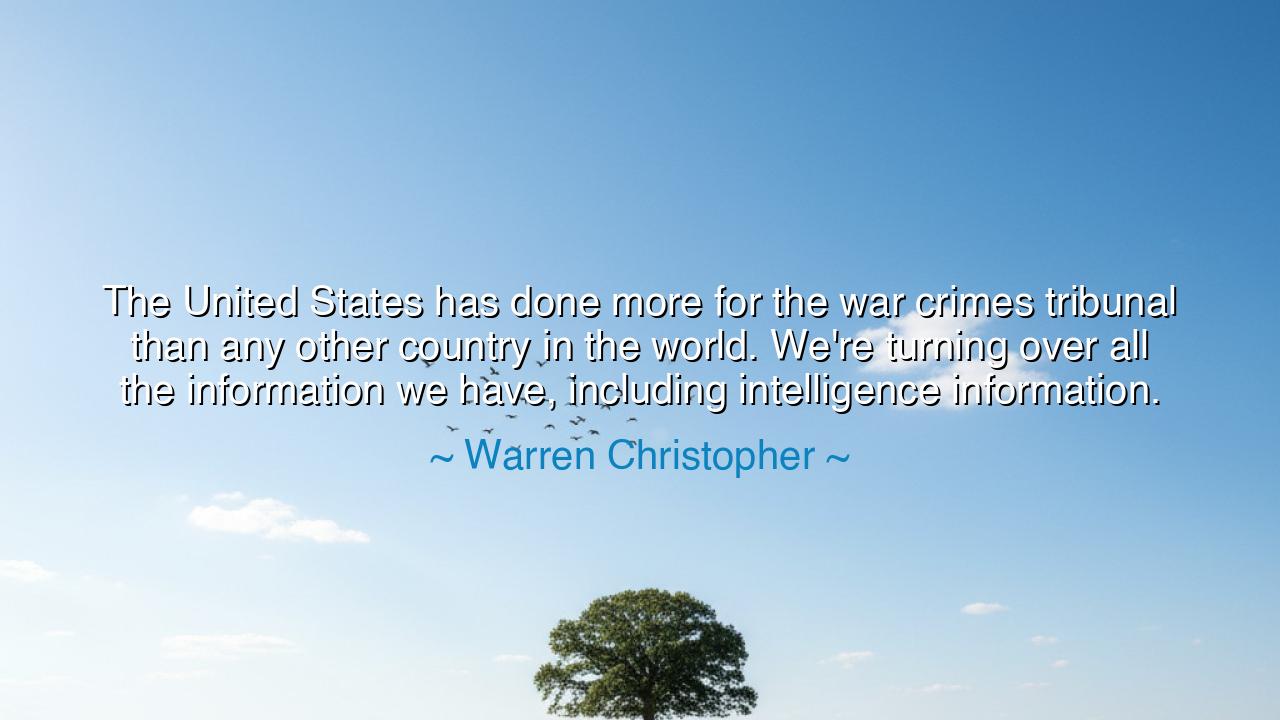
The United States has done more for the war crimes tribunal than
The United States has done more for the war crimes tribunal than any other country in the world. We're turning over all the information we have, including intelligence information.






When Warren Christopher proclaimed, “The United States has done more for the war crimes tribunal than any other country in the world. We’re turning over all the information we have, including intelligence information,” he spoke as a man standing at the crossroads of justice and diplomacy, in a world still scarred by the memory of war. His words were not mere political assurance—they were a declaration of moral purpose, rooted in the eternal struggle between truth and silence, accountability and denial. For in every age, after the fires of conflict have burned low, humanity must face its own reflection—and demand that justice be done, not as vengeance, but as remembrance.
Christopher, who served as U.S. Secretary of State in the 1990s, spoke these words in the wake of the Balkan conflicts, when the international community sought to hold perpetrators of genocide and war crimes to account. The world had witnessed horrors reminiscent of the darkest chapters of the twentieth century—the siege of Sarajevo, the massacre at Srebrenica, the suffering of countless innocents. In that hour, the International Criminal Tribunal for the former Yugoslavia stood as a beacon of human conscience, a symbol that even in a fractured world, law must rise above power. Christopher’s pledge of support, and his mention of sharing intelligence information, signified a new kind of courage: not the courage of the battlefield, but the courage of transparency, the willingness to shed light on deeds that many would prefer remain hidden.
To the ancients, this act would have been called justice born of wisdom. For the wise knew that when the sword has done its work, the pen must heal what remains. The philosopher Cicero, himself a man of politics and principle, once said, “Justice is the crowning glory of virtue.” What Christopher affirmed was the same truth in modern form—that no nation, however powerful, stands above the moral law. To assist the tribunal, to reveal even guarded truths of intelligence, was to honor the higher order that binds all peoples: that evil must be named, and the innocent must not be forgotten.
History offers a mirror for this moment. After the Second World War, the Nuremberg Trials sought to hold accountable those who had orchestrated atrocities across Europe. Many doubted that such trials could succeed—that justice could ever balance the scales of so vast an evil. Yet they did, not because punishment could erase pain, but because truth, once spoken, has the power to redeem the world’s conscience. The architects of those trials, like the leaders who followed in Christopher’s time, understood that without truth, peace becomes fragile; without accountability, freedom decays. The tribunal, whether in Nuremberg or The Hague, is not only a court—it is a sanctuary for the human spirit.
In Christopher’s statement lies another truth: that knowledge is responsibility. To possess information about wrongdoing and to hide it is to become complicit in it. The act of “turning over all the information we have,” as he said, reflects a principle that transcends politics: that truth must not be hoarded but revealed, for only through revelation can healing begin. Intelligence, often guarded as the crown of statecraft, finds its noblest purpose when used not for advantage, but for justice. In this, we see the transformation of power into virtue—the conversion of secrecy into service.
Let this teaching, then, be carried forward into all generations: that the defense of justice demands not only bravery in war, but honesty in peace. Every person and every nation is called, at some point, to stand before their own history. Some will hide behind pride or denial; others, like Christopher, will choose the harder path—to speak, to reveal, to cooperate in truth, even when it stings. For true strength lies not in concealing flaws, but in confronting them.
And so, from this moment of modern diplomacy, a timeless lesson emerges: that the work of justice belongs to all. Whether one is a leader, a citizen, or a simple witness to wrongdoing, each has a duty to ensure that truth is not buried beneath convenience. The world becomes safer, not through silence, but through courage—the courage to remember, to testify, and to act. As Warren Christopher’s words remind us, the commitment to justice is not merely the task of nations—it is the sacred labor of humanity itself.
Thus, let the wise reflect: when you hold truth in your hands, you hold the seed of peace. Guard it not in secrecy, but plant it in the open soil of honesty, so that the generations to come may live in a world governed not by fear or deception, but by the light of justice and the strength of truth.






AAdministratorAdministrator
Welcome, honored guests. Please leave a comment, we will respond soon